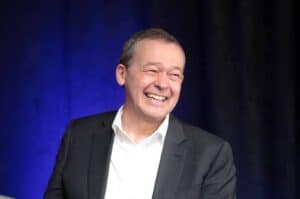
(Update: the original plan to launch Lucid Air production was spring 2021. Peter Rawlinson misspoke in our interview and said “September.” That has now been corrected.)
There seems little doubt that the future is electric. What’s unclear is who the winners will be, what with so many startups lining up to challenge established automakers – as well as one another. While Tesla appears well positioned to come out among the top tier of new entrants, Lucid seems to have plenty going for it, too.
Founded in 2007, the California-based carmaker expects to launch its first product, the sleek Lucid Air sedan, later this year. An assortment of products, including an all-electric SUV, will follow. With a potentially game-changing range of up to 517 miles per charge, the Air has generated plenty of buzz, powering a planned SPAC reverse merger that will make it a publicly traded company. That process will raise billions in new capital.
Unlike Tesla’s Elon Musk, Lucid CEO and CTO Peter Rawlinson is no automotive newbie. He has worked with an assortment of manufacturers during the past 30 years, including Lotus and Jaguar, as well as Tesla where he was brought in to head the Model S development program.
Rawlinson talked with TheDetroitBureau.com about the automaker’s product program, the future of the EV industry, Lucid’s plan to go public – and the fickleness of Wall Street investors who have driven the share price of Lucid partner Churchill Capital Corp IV down more than 60% in the past month.
Public acceptance of EVs
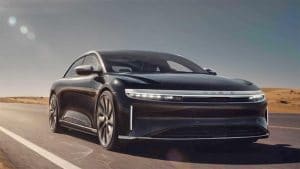
TDB: I’m noticing more and more people becoming open to electric vehicles. Is this the year EVs become an acceptable part of the market?
Rawlinson: I think that is happening. I think we’re going to see the pendulum swing massively towards electrification. The last arguments against EVs have been eroded. We’re seeing a maturity and expansion of the fast-charging network. That’s one thing. And range anxiety, having a car like we’ve got with a 500-mile range, it erodes the final bastion of resistance. I guess there’s one last place, the cost of buying one, and that’s what we have to work on next.
TDB: Morgan Stanley auto analyst Adam Jonas just noted that Tesla’s share of the U.S. EV market is tumbling – down from 81% to 69% since the launch of the Ford Mach-E. Can you also take share away from Tesla?
Rawlinson: I don’t see us having to take share away from Tesla. It’s us taking share away from internal combustion engines that really matters. Our first model, the (Air) Dream Edition is a Mercedes S-Class competitor. We’re playing in a class with the S-Class, the BMW 7-Series and the Audi A8, the Lexus LS and Jaguar XJ. They all have one thing in common: they’re gasoline. Right now there’s no electric car. That’s a fantastic market to be in.
Product plans
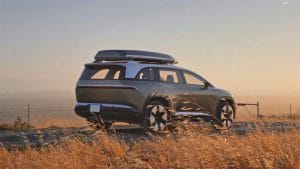
TDB: There are some people who wish Lucid had started with an SUV, rather than a sedan. Should you have? And how soon will you have an SUV?
Rawlinson: The first product defines a brand. We’re going to be a luxury car manufacturer. As with Mercedes, the S-Class defines that brand. Tesla started with a sedan. The hardest thing to do is a world-class sedan. There is a perception the sedan market is tanking, but it’s still very significant. SUVs are a big market, and a growing one and that’s why we need to get our SUV out (next) as quickly as possible off the Air platform. We’re going to get an economy of scale because the SUV will be our biggest seller, undeniably.
We’re going to launch “Project Gravity” and get that into (production) in 2023. It’s interesting to note that if you look at Tesla, it took four years after the Model S to get the Model X (SUV) into production.
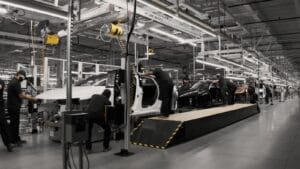
TDB: And what are you planning beyond that?
Rawlinson: Oh, well, after that is our second platform. That, I suppose, would be equivalent to our Tesla Model Y, something in the $40,000, $45,000 range. I want to get that as quickly as possible because I want to get scale into Arizona. We now have 365,000 units planned.
TDB: We hear a lot of startups laying out grand plans. Even Tesla is struggling to make money on their car production. So, isn’t it still a struggle for a new entrant?
Rawlinson: It’s a huge challenge and … we haven’t sold a car yet. I approach this with humility. We have to get the first car into production. The entire team is pushing, pushing, pushing to have a great launch before we talk about any other things. We’re taking baby steps and that keeps us on track. We built the factory in record time. Right now, it’s good for 34,000 units a year. We’re making our pre-production release candidates. We’re getting the quality right. We’re working with all our suppliers. We’re just marching towards production.
Dealing with competition
TDB: So, who worries you more? Is it Tesla? One of the other nascent EV makers? Or is it one of the established manufacturers, like General Motors, VW or Ford? Who are you looking over your shoulder at?
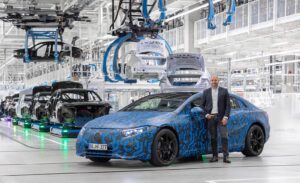
Rawlinson: That’s a very interesting question. I’m going to tell you something that is going to come across as terribly arrogant because I’m not worried about any of them. Honestly, I mean that. I can’t wait for the (all-electric) Mercedes EQS to come out and compare it with this sedan. I’m almost like a prize fighter who wants to get in the ring. I’m ready for it. I thrive on this tech war. I’m a complete nerd for this stuff. I just want us to be the best.
That’s how I drove the team 10 years ago when I was chief engineer on the (Tesla) Model S. People thought I was crazy because it was already fantastic but I always took the approach that it could be a little better. If I didn’t really push and give it my all and (the competition) is a little better than us I was going to regret it for a lifetime. With the Air, it’s just reach for the stars. I don’t tend to set targets. It’s “how good can we make this thing?”
TDB: These days, even traditional automakers don’t like to describe themselves as car companies. They’re “mobility service providers,” or the like ….
Rawlinson: Everybody likes to say that, but we are a car company. And we’re a tech company. And I’m proud that we are a car company. It’s got four wheels on it. It is a car. It’s just a very high-tech car. Ever since I left university, all I ever wanted to do was cars. And I’ve spent my entire career engineering cars. It’s been a love affair.
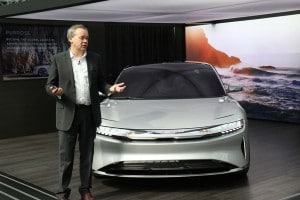
Going public
TDB: Let’s talk financials. Why did you choose to do a SPAC reverse merger?
Rawlinson: It’s a very convenient and appropriate tool that has enabled us to go public in a very efficient way and a very timely manner. We’ve raised $4.5 billion. Compare that to how Tesla started out. They were always going back to the trough to raise more money, and it was always a struggle. What we’ve been able to do is use this SPAC to show the benefits of the company and we got an illustrious group of investors, the bluest of the blue chip. It’s unprecedented. They think we’re the real deal.
This has been a fantastic way for me to safeguard the future of the company long term with a serious injection of cash. That safeguards us through to the early part of 2023 when Project Gravity comes out.
TDB: Now, on the dark side, CCIV (the stock ticker for Churchill Capital) has gone down about 60% since peaking. (It closed at $22.09 a share Monday, down from a peak of $64.86 a share.) That’s certainly raised some concerns. It appears one concern is that you pushed back the launch date for the Lucid Air.
Rawlinson: There’s an incorrect message out there that we somehow changed the storyline. We haven’t changed anything from the presentation material we provided to Churchill Capital and investors. We put in our manifesto that we would manufacturer the car in the second half. I was pushing for a (spring) start of production. Now, we have an alignment of minds that we will get the project right and not worry about the date and underpromise and overdeliver as a public company. I think that’s not been digested very well by investors. But, you know, it was all based on speculation, the $64 (52-week high).
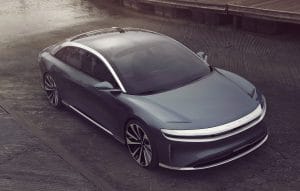
TDB: So, you’re going to have to start meeting all your targets to win confidence back.
Rawlinson: I’m used to this. We’ve been hitting targets with our key investors for the last two years against KPIs, key performance indices. This is not alien to me at all. Remember, we built the first greenfield, purpose-built EV factory in North America in record time against the backdrop of a pandemic. Meeting targets is bread-and-butter for us. (Ultimately) the product is king, and everybody knows this. Let the car do the talking. I can’t wait to bring it out.
Big announcement
TDB: Before we wrap up, I hear you’ll have an announcement on March 17 about infotainment technology?
Rawlinson: Yes, it’s Dolby Atmos Surround Sound. It’s going to be the best sound system, off the planet. It’s like going from mono to stereo.
TDB: Can you tell us more?
Rawlinson: No. You’ll have to wait until then.







